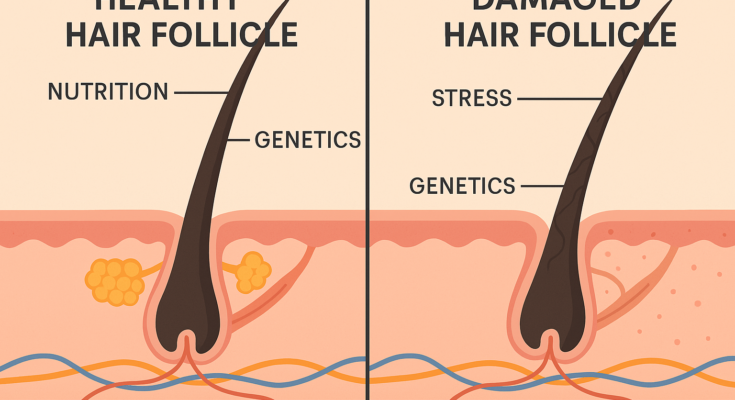Understanding Hair Loss: Common Causes and Effective Solutions
Hair loss is a universal concern, affecting people of all ages and backgrounds. While it can feel overwhelming, identifying the root cause is the first step toward reclaiming healthy, vibrant hair. Let’s explore the most common triggers and practical strategies to address them.
Common Causes of Hair Loss
- Genetics (Hereditary Baldness)
The leading cause of hair loss in both men and women, hereditary patterns often start with thinning at the hairline or crown. This gradual process, known as androgenetic alopecia, is linked to family history and hormonal changes. - Stress or Trauma (Telogen Effluvium)
Emotional stress, major surgery, illness, or significant life changes can push hair follicles into a “resting phase,” leading to sudden shedding. This delayed reaction typically appears 2-3 months after the triggering event. - Nutritional Deficiencies
Your hair thrives on nutrients like iron, zinc, vitamin D, B12, and protein. Crash diets, restrictive eating, or poor absorption can starve follicles, resulting in weak, brittle strands. - Hormonal or Health Conditions
Thyroid disorders, polycystic ovary syndrome (PCOS), and postpartum hormonal shifts are frequent culprits. Even temporary imbalances during pregnancy or menopause can disrupt hair growth cycles. - Medications or Treatments
Certain drugs for blood pressure, cholesterol, or depression may list hair loss as a side effect. Chemotherapy, while lifesaving, often causes dramatic but temporary shedding. - Harsh Styling or Products
Overprocessing with dyes, relaxers, or heat tools weakens hair over time. Tight hairstyles like braids or ponytails can also traumatize follicles, leading to traction alopecia.
Effective Strategies to Combat Hair Loss
- Start with Medical Testing
Persistent shedding warrants a checkup. Key tests include:- Complete blood count (CBC)
- Ferritin (iron storage)
- Vitamin D, B12, and zinc levels
- Thyroid function (TSH)
Addressing deficiencies or hormonal issues often kickstarts recovery.
- Targeted Supplements and Treatments
- Biotin: Supports keratin production if lacking in your diet.
- Multivitamin blends: Formulas like Viviscal or Nutrafol combine hair-friendly nutrients.
- Minoxidil 5%: This FDA-approved topical solution stimulates follicles, especially for genetic hair loss.
- Natural oils: Rosemary, castor, or jojoba oil boost scalp circulation—massage gently for best results.
- Nourish from Within
Prioritize protein-rich foods (eggs, fish, legumes), leafy greens, nuts, and seeds. Hydration matters too—aim for 8 glasses of water daily to keep follicles resilient. - Gentle Hair Care Habits
- Avoid tight hairstyles that pull on roots.
- Use sulfate-free shampoos to preserve natural oils.
- Pat hair dry with a microfiber towel instead of rough rubbing.
Why Early Action Matters
Catching hair loss early improves outcomes. For instance, minoxidil works best when thinning is mild. Pairing medical insights with consistent care creates a powerful defense against further loss.


